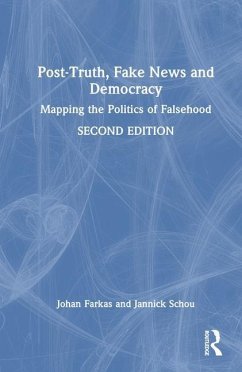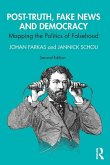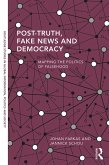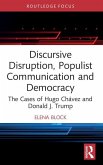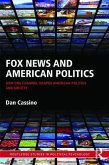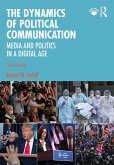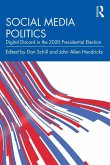The new edition of Post-Truth, Fake News and Democracy offers an updated overview and critical discussion of contemporary discourses around truth, misinformation, and democracy, while also mapping cutting-edge scholarship.
Through in-depth analyses of news articles, commentaries, academic publications, policy briefs, and political speeches, the book engages with the underlying normative ideas that shape how fake news is being addressed across the globe. Doing so, it provides an innovative, critical contribution to contemporary debates on democracy, post-truth, and politics.
Three new chapters: Chapter 2 provides an outline of the scholarly field of research into fake news; Chapter 5 examines how issues of fake news and (mis)information have become intertwined with contemporary crisis events; and Chapter 9 presents democratic alternatives to post-truth solutionism.A new foreword by Professor Sarah Banet-Weiser.Fully updated examples and studies from contemporary events, including the COVID-19 pandemic, the United States Capitol attack, and the Russian invasion of Ukraine.Extended discussions on the causes of democratic decline, currently proposed solutions to fake news, and democratic alternatives to our current predicament.
Interesting, informative, and well documented, Post-Truth, Fake News and Democracy continues its commitment to understand and engage with the current state and future of democracy.
Through in-depth analyses of news articles, commentaries, academic publications, policy briefs, and political speeches, the book engages with the underlying normative ideas that shape how fake news is being addressed across the globe. Doing so, it provides an innovative, critical contribution to contemporary debates on democracy, post-truth, and politics.
Three new chapters: Chapter 2 provides an outline of the scholarly field of research into fake news; Chapter 5 examines how issues of fake news and (mis)information have become intertwined with contemporary crisis events; and Chapter 9 presents democratic alternatives to post-truth solutionism.A new foreword by Professor Sarah Banet-Weiser.Fully updated examples and studies from contemporary events, including the COVID-19 pandemic, the United States Capitol attack, and the Russian invasion of Ukraine.Extended discussions on the causes of democratic decline, currently proposed solutions to fake news, and democratic alternatives to our current predicament.
Interesting, informative, and well documented, Post-Truth, Fake News and Democracy continues its commitment to understand and engage with the current state and future of democracy.
Endorsements for the Second Edition
"The issue is not, argue Farkas and Schou, a confrontation between post-truth and rationality, but a question of democracy, implying a clash between different interpretations of truth, which in turn requires adequate and egalitarian opportunities for discourse and exchange for its constantly reiterated search for agreements and compromises. These qualities are usually absent in most societies. However lively current debates over post-truth and fake news, this vital dimension is usually overlooked. This is a book that not only deserves to be widely read, but which should also inspire movements and campaigns."
Colin Crouch, Professor Emeritus at the University of Warwick, UK, External scientific member of the Max Planck Institute for the Study of Societies at Cologne.
"One of the most original studies on liberal democratic politics today, Farkas and Schou's book offers a stunning discourse analysis of the ways we talk about fake news and alternative facts, revealing how these ways of talking profoundly shape our political imaginaries in a manner reductive and perilous for democracy itself. But more than a compelling exploration of how discourses on post-truth work and why they matter, the book is also invaluable as a resource for the reinvention of democratic politics by placing people's voices and public deliberation at the heart of the political process. This is a contemporary classic and I cannot recommend it highly enough to anyone - scholar, student, journalist or concerned citizen - seeking to understand the challenges of our media-saturated world."
Lilie Chouliaraki, Professor and Chair in Media and Communications in the Department of Media and Communications at LSE, UK.
"Post-Truth, Fake News and Democracy: Mapping the Politics of Falsehood is a clear-eyed critique of the new political imaginaries of "post-truth worlds" which have dominated popular and scholarly discourse since 2016. Johan Farkas and Jannick Schou systematically demonstrate how these discourses have limited not only how we conceptualize the relationship between democracy, information, and digital media, but the possible solutions. Instead, scholars must grapple with the legacy of political manipulation in liberal democracy, contextualizing the current moment within longer, and messier, histories. The book is a call to decouple academic work from trends, hot takes, and think pieces about "infodemics" and "fake news," enabling us to rethink our assumptions about democracy and imagine more radical futures."
Alice E. Marwick, Associate Professor in the Department of Communication, Co-Director of The Center for Information, Technology, and Public Life, University of North Carolina at Chapel Hill, USA.
"A wonderful scholarly polemic that argues that 'fake news' and 'misinformation' are not new but hard-wired into a media system that is skewed by the distortions and exclusions of corporate power and liberal democracy. It maps out in a comprehensive and accessible fashion both the problems and some of the radical democratic solutions we need for a meaningfully accountable media. Essential reading to make sense of post-truth discourses."
Des Freedman, Professor of Media and Communication Studies, Head of Department and Co-Director of the Goldsmiths Leverhulme Media Research Centre, Goldsmiths, University of London, UK.
Endorsements for the First Edition
"Post-truth, Fake news and Democracy provides a highly original analysis of how discourses of truth have emerged in the 'fake news' era. It shows how (re)equating democratic governance with only reason, rationality and truth undermines the voice of the people and excludes those most disaffected with politics. Anyone interested in contemporary debates on power and democracy will be both challenged and captivated by this book."
Ariadne Vromen, Professor of Political Sociology, Department of Government and International Relations, University of Sydney, Australia.
"Drawing on groundbreaking empirical and theoretical work, Farkas and Schou demonstrate the double threat to democracy posed by post-truth propaganda and its obverse: an authoritarian backlash to the politics of Truth with a capital T. Post-truth, Fake news and Democracy provides an invaluable conceptual roadmap for navigating the political perils of the contemporary media landscape with an unwavering commitment to democratic politics. The authors provide more than compelling arguments and timely analysis they offer a powerful and carefully constructed resource for hope."
Mark Andrejevic, Professor at the School of Media, Film, and Journalism, Monash University, Australia.
"The book I have been waiting for - a critical interrogation of post-truth and fake news discourses embedded in their political and historical context that puts democratic renewal centre stage. Farkas and Schou skilfully draw upon political philosophy to argue that it is democracy rather than truth claims that should take priority if we really want deeper, better and more inclusive democratic institutions and societies. As they put it ,"we don't need more truth but more politics". This book is not only conceptually compelling but also politically important. It helped me understand not only what is going on but also what to do about it. A book for our times. Read it."
Natalie Fenton, Professor of Media and Communications, Co-Director Centre for the Study of Global Media and Democracy, Goldsmiths, University of London, UK.
"This is a book that needed to be written. Through an impressive empirical mapping and discourse theoretical analysis of recent post-truth and fake news discourses, the authors identify, and problematize, how democracy in these discourses is articulated as a technocratic order based on "the rule by truth." In the process, and with the help of historical contextualization, Farkas and Schou expose the reactionary anti-democratic imaginary within the discourses, and consequently open space to once more envision democracy in terms of "the rule by the people." This incredibly insightful and important book is a must read for all students, scholars, and proponents of democracy."
Lincoln Dahlberg, Researcher in Media Politics and Digital Democracy.
"Few deny the emergence and importance of post-truth politics, fake news, and the changing impact of the public and social media on democratic politics, though it is difficult to find compelling diagnoses and alternatives. In Post-truth, Fake news and Democracy, Johan Farkas and Jannick Schou provide a compelling diagnosis of the contemporary discourses on "post-truth" through an in-depth analysis of news articles, commentaries, academic publications, policy briefs and political speeches. Carefully linking empirical research and critical political philosophy, the book successfully challenges those who call simply for greater truth and rationality by outlining a deeper conception of democracy, and its attendant institutions and practices. This is an important and path-breaking contribution that responds to a pressing issue in contemporary society and politics."
David Howarth, Professor and Director of the Centre for Ideology and Discourse Analysis, University of Essex, UK
"The issue is not, argue Farkas and Schou, a confrontation between post-truth and rationality, but a question of democracy, implying a clash between different interpretations of truth, which in turn requires adequate and egalitarian opportunities for discourse and exchange for its constantly reiterated search for agreements and compromises. These qualities are usually absent in most societies. However lively current debates over post-truth and fake news, this vital dimension is usually overlooked. This is a book that not only deserves to be widely read, but which should also inspire movements and campaigns."
Colin Crouch, Professor Emeritus at the University of Warwick, UK, External scientific member of the Max Planck Institute for the Study of Societies at Cologne.
"One of the most original studies on liberal democratic politics today, Farkas and Schou's book offers a stunning discourse analysis of the ways we talk about fake news and alternative facts, revealing how these ways of talking profoundly shape our political imaginaries in a manner reductive and perilous for democracy itself. But more than a compelling exploration of how discourses on post-truth work and why they matter, the book is also invaluable as a resource for the reinvention of democratic politics by placing people's voices and public deliberation at the heart of the political process. This is a contemporary classic and I cannot recommend it highly enough to anyone - scholar, student, journalist or concerned citizen - seeking to understand the challenges of our media-saturated world."
Lilie Chouliaraki, Professor and Chair in Media and Communications in the Department of Media and Communications at LSE, UK.
"Post-Truth, Fake News and Democracy: Mapping the Politics of Falsehood is a clear-eyed critique of the new political imaginaries of "post-truth worlds" which have dominated popular and scholarly discourse since 2016. Johan Farkas and Jannick Schou systematically demonstrate how these discourses have limited not only how we conceptualize the relationship between democracy, information, and digital media, but the possible solutions. Instead, scholars must grapple with the legacy of political manipulation in liberal democracy, contextualizing the current moment within longer, and messier, histories. The book is a call to decouple academic work from trends, hot takes, and think pieces about "infodemics" and "fake news," enabling us to rethink our assumptions about democracy and imagine more radical futures."
Alice E. Marwick, Associate Professor in the Department of Communication, Co-Director of The Center for Information, Technology, and Public Life, University of North Carolina at Chapel Hill, USA.
"A wonderful scholarly polemic that argues that 'fake news' and 'misinformation' are not new but hard-wired into a media system that is skewed by the distortions and exclusions of corporate power and liberal democracy. It maps out in a comprehensive and accessible fashion both the problems and some of the radical democratic solutions we need for a meaningfully accountable media. Essential reading to make sense of post-truth discourses."
Des Freedman, Professor of Media and Communication Studies, Head of Department and Co-Director of the Goldsmiths Leverhulme Media Research Centre, Goldsmiths, University of London, UK.
Endorsements for the First Edition
"Post-truth, Fake news and Democracy provides a highly original analysis of how discourses of truth have emerged in the 'fake news' era. It shows how (re)equating democratic governance with only reason, rationality and truth undermines the voice of the people and excludes those most disaffected with politics. Anyone interested in contemporary debates on power and democracy will be both challenged and captivated by this book."
Ariadne Vromen, Professor of Political Sociology, Department of Government and International Relations, University of Sydney, Australia.
"Drawing on groundbreaking empirical and theoretical work, Farkas and Schou demonstrate the double threat to democracy posed by post-truth propaganda and its obverse: an authoritarian backlash to the politics of Truth with a capital T. Post-truth, Fake news and Democracy provides an invaluable conceptual roadmap for navigating the political perils of the contemporary media landscape with an unwavering commitment to democratic politics. The authors provide more than compelling arguments and timely analysis they offer a powerful and carefully constructed resource for hope."
Mark Andrejevic, Professor at the School of Media, Film, and Journalism, Monash University, Australia.
"The book I have been waiting for - a critical interrogation of post-truth and fake news discourses embedded in their political and historical context that puts democratic renewal centre stage. Farkas and Schou skilfully draw upon political philosophy to argue that it is democracy rather than truth claims that should take priority if we really want deeper, better and more inclusive democratic institutions and societies. As they put it ,"we don't need more truth but more politics". This book is not only conceptually compelling but also politically important. It helped me understand not only what is going on but also what to do about it. A book for our times. Read it."
Natalie Fenton, Professor of Media and Communications, Co-Director Centre for the Study of Global Media and Democracy, Goldsmiths, University of London, UK.
"This is a book that needed to be written. Through an impressive empirical mapping and discourse theoretical analysis of recent post-truth and fake news discourses, the authors identify, and problematize, how democracy in these discourses is articulated as a technocratic order based on "the rule by truth." In the process, and with the help of historical contextualization, Farkas and Schou expose the reactionary anti-democratic imaginary within the discourses, and consequently open space to once more envision democracy in terms of "the rule by the people." This incredibly insightful and important book is a must read for all students, scholars, and proponents of democracy."
Lincoln Dahlberg, Researcher in Media Politics and Digital Democracy.
"Few deny the emergence and importance of post-truth politics, fake news, and the changing impact of the public and social media on democratic politics, though it is difficult to find compelling diagnoses and alternatives. In Post-truth, Fake news and Democracy, Johan Farkas and Jannick Schou provide a compelling diagnosis of the contemporary discourses on "post-truth" through an in-depth analysis of news articles, commentaries, academic publications, policy briefs and political speeches. Carefully linking empirical research and critical political philosophy, the book successfully challenges those who call simply for greater truth and rationality by outlining a deeper conception of democracy, and its attendant institutions and practices. This is an important and path-breaking contribution that responds to a pressing issue in contemporary society and politics."
David Howarth, Professor and Director of the Centre for Ideology and Discourse Analysis, University of Essex, UK

